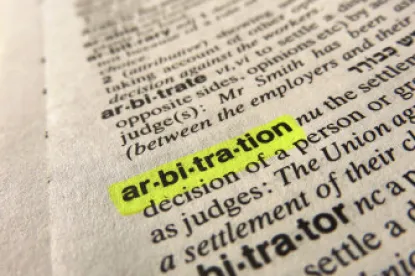Although the Supreme Court of the United States has not yet taken up the issue, California courts routinely hold an employee cannot be compelled to submit to arbitration an action seeking penalties under the Private Attorneys General Act of 2004 (PAGA), although the employee may be compelled to arbitrate his or her individual wage claims. In determining whether a litigant seeks individual damages and therefore may be compelled to arbitrate wage claims, does the plaintiff’s Labor and Workforce Development Agency (LWDA) notice letter control? On April 8, 2020, the California Court of Appeal published its decision in Brooks v. AmeriHome Mortgage Company, LLC, finding that the content of an LWDA letter underlying a PAGA action is not dispositive to this inquiry.
Background
Anthony Brooks was employed by AmeriHome Mortgage Company. His employment agreement contained an arbitration provision, in which he agreed that “any dispute or controversy arising out of or relating to this Agreement or your employment . . . will be settled exclusively by arbitration.”
In California, a litigant seeking to bring a representative wage and hour action under PAGA first must file a predicate notice of violation with the LWDA. In this case, Brooks filed a PAGA notice with the LWDA that stated he sought penalties and wages both on behalf of himself and other AmeriHome employees. AmeriHome filed a demand to arbitrate Brooks’ individual wage claims with a request to stay the representative PAGA action pending resolution of Brooks’ individual claim.
Brooks filed a first amended complaint stating a single cause of action under PAGA. Whereas his LWDA notice sought individual and representative damages, the first amended complaint now sought only representative PAGA penalties. Brooks then sought and was granted a preliminary injunction to enjoin the arbitration proceedings.
AmeriHome appealed on the ground that the LWDA notice alleged individual victim-specific violations under the California Labor Code and therefore his claim for individual damages must be arbitrated pursuant to the parties’ agreement. Because the LWDA notice is a prerequisite for bringing a PAGA action, the company argued, its allegations must be given weight. The Court of Appeal disagreed, finding the content of the LWDA notice could not supplant the representative-only allegations in the first amended complaint.
Key Takeaways
This decision appears to narrow avenues for compelling arbitration of certain wage claims under California law: an employer cannot rely on the content of an LWDA letter that is inconsistent with a civil complaint to determine whether individual damages are sought. This decision, if followed by other courts, may result in the proliferation of single-count PAGA causes of action, with the representative plaintiff seeking no individual damages. Nonetheless, employers may want to continue advancing agreements that compel arbitration of both individual and class action claims.



 />i
/>i

